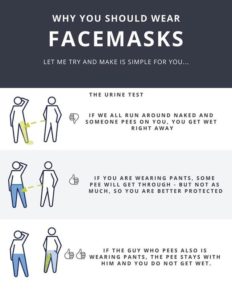As COVID-19 plunges into its sixth month, the world has begun to find humor out of the pandemic through relatable viral memes as a collective coping mechanism. These hilarious memes unite the common global experience of quarantine and social distancing while “shaming” individuals that display socially ludicrous behavior. However, can these seemingly uncomplicated Internet creations raise awareness about the social measures needed to be taken in the pandemic and debunk misinformation, especially about wearing masks?
Meme-ing Together: How Memes Help us Connect over the Pandemic
COVID-19 memes are diverse: from images highlighting how wearing masks can help you avoid your acquaintances to creative and sometimes horrifying images of homemade masks. More than ever, these ingenious creations deliver genuine laughs in desperate times. Although the pandemic clearly is a serious topic, finding a glimpse of humor is not the worst thing one can do in the given situation.
Despite having low informational value, memes gratify our needs for social companionship and digital presence and alleviate loneliness. We are in this together, literally, on the web.
As we are still physically separated, the Internet is unquestionably the center where social interactions take place. Thus, memes provide resources and coping mechanisms that allow us to remain in contact with others. According to Diggit Magazine, memes can be categorized as “phatic communication,” where the content facilitates meaning, but “feelings of connection, sociability, group membership, and mutual awareness.” Despite having low informational value, memes gratify our needs for social companionship and digital presence and alleviate loneliness. We are in this together, literally, on the web.
Memes as Sarcastic Public Condemnation: The Karens and the Half-A**es
Since wearing masks became the symbol of social distancing around the world, the opposition to this effective measure has been rampant. The severity varies: from constant protests and random erupted tantrums in public spaces refusing to wear masks to half-heartedly wearing one. As a result, wearing masks evolves into one of the main themes of the COVID-19 meme collection. Creators humorously criticize the individuals that hinder protective measures while not abiding by the social contract.
Leading in this newly created category is the “Karen” meme, a resurging figure of annoyance associated with white, middle-aged, entitled women. According to Vox, the Karens share one fundamental similarity: “White women ruining the party for everyone else.” They also exhibit traits such as “pushy behavior, classism, and anti-science views.” Masks, in the cluttered world of Karens, make them hard to breathe, so they unanimously decide not to wear them. Although the Karens are not uncommon in our complicated world, their defiance of wearing masks has triggered the Internet, with meme masters capturing their tantrums for online consumption. They are anti-mask, they are aggressive, and they are willing to fight you.
More regularly, we witness the wild appearances of the half-a**ed mask wearers, where they miss the whole point of why governments have been urging their citizens to follow this initiative. Expectedly, the meme gods have seized the opportunity and presented the world with the “Ineffective Face Mask Bingo.” From the “chin strap” to the “schnoz,” these original memes lambaste those who need to put in more effort to end the pandemic.
Spreading Awareness through Memes
Although most memes are quite mindless and trivial, some users have repurposed the memes to raise awareness and spread information about the pandemic. The prime example of this trend is undoubtedly the “Urine Test” meme that has been circulating social media, demonstrating how if everyone wears “pants” or masks, no one will get “wet” or infected. The Philadelphia Department of Public Health reposted the viral meme and believed the meme appropriately “emphasizes the purpose of masks in a way that grabbed people’s attention.”

Furthermore, this particular meme reinforces the protection offered by face masks and serves as an effective tool for science and risk communication. Eleanor J. Murray, assistant professor Mut escort of epidemiology at Boston University, stated how the meme’s analogy “helps relate mask use to something that people can easily understand.” Although the meme’s medical accuracy is still under question, Dr. Stephen S. Morse, a professor of epidemiology at Columbia University, asserts that he is “in favor of whatever encourages people to take more precautions” and more proactive in protecting themselves and others.
The meme train does not stop at ordinary citizens and medical professionals but has also been promoted on social media by beloved celebrities such as Anne Hathaway and Reese Witherspoon. By reposting memes that advocate mask use, these Hollywood stars utilize their popularity and impact for the public good, showing their stance on this divided issue.
The Bottom Line
Although most memes on social media have mainly proposed the necessity of social distancing and wearing face masks, there have also been echoes of disinformation floating online. Donald Trump Jr., son of the US President, made headlines after tweeting a conspiracy-theory meme discarding the practicality of wearing face masks. The meme reads: “This is what virologists wear to protect themselves from a virus. Don’t worry, though. Your Pozcu escort bandana probably works too.” Besides the meme being pretty much unfunny, one must be warned against false information masqueraded as memes spreading across social media platforms.
Memes are entertaining, yes, but they also underline a clear-cut bottom line: WEAR YOUR MASKS!
Memes are impactful tools that can make us laugh while reminding us that we are still pretty much living in an ongoing pandemic. Therefore, we must continue to combat this situation together by complying with social distancing measures. According to the CDC, the purpose behind wearing masks is to “prevent personal droplets from spreading to others,” as droplets from unknowingly infected individuals can be inhaled into Silifke escort the lungs. Memes are entertaining, yes, but they also underline a clear-cut bottom line: WEAR YOUR MASKS!
Cover: Pixabay/Anastasia Gepp





